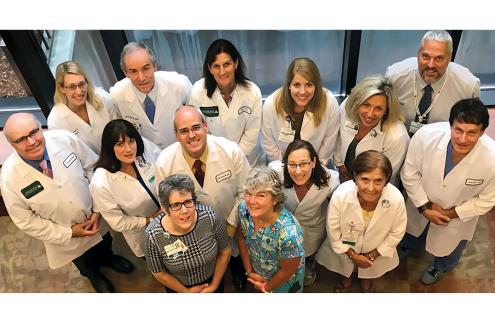
When occupational therapist Jan Ray-Thompson, OT, was diagnosed with breast cancer in June 2016, she was so impressed by the care she received at the Breast Care Center at Cheshire Medical Center, six months later she joined the care team, becoming the rehabilitation team representative.
“From the day my primary care physician confirmed the lump I felt in my breast and was able to schedule a mammogram right away, through surgery, chemotherapy, radiation, and physical therapy, every single person who cared for me was just incredible,” Ray-Thompson relates. “They not only were kind and considerate, but their knowledge and expertise were so reassuring. And everything I needed was right here. “They were my team,” she adds, “always there to quell my anxieties, answer questions, soothe my anger. We laughed together a lot, too. Having been through that experience in such a positive way, I wanted to help other folks facing a similar diagnosis.” This sense of partnership—between the care team and patients, as well as within the team itself—underscores why Cheshire’s Breast Care Center earned a full three-year accreditation from the National Accreditation Program for Breast Centers (NAPBC), a program administered by the American College of Surgeons.
“NAPBC accreditation means we have met rigorous national standards for providing high-quality breast care,” explains Harrison E.G. Burman, MD, surgeon and Medical Director of the Breast Care Center at Cheshire Medical Center. These standards ensure that patients have access to:
- A full range of state-of-the-art breast care services
- A multidisciplinary team approach to coordinate the best treatment options
- Information about clinical trials and new treatment options
- And, most importantly, quality breast care close to home
“More than 20 providers—including radiologists, radiation oncologists, surgeons, medical oncologists, rehabilitation staff, nutritionists, and social workers—came together to ensure that patients in this region have access to this comprehensive level of breast care, in one convenient location,” Dr. Burman continues. “The treatment of breast cancer has evolved over the years and it is more crucial than ever to have this multi-modality team approach,” says Hematologist-Oncologist Arvind K. Randhawa, MD.
“Because all these specialists are available in the same hospital, patients don’t have to worry about consolidating their care.” “By establishing a coordinated group of practitioners from multiple disciplines, we’re making sure patients with breast disease are guided along their journey and getting the care they need, when they need it,” Dr. Burman says. “Through the multidisciplinary team, treatment also addresses more than the disease,” notes Robert S. Pritchard, MD, MS, Medical Director of Norris Cotton Cancer Center-Kingsbury Pavilion-Keene. “We are caring for the whole person. Patients and their caregivers receive the highest quality of personalized care and attention during and beyond the diagnosis of breast cancer.” “Our providers have always delivered excellent breast care,” Dr. Burman adds. “The NAPBC accreditation gives patients even greater confidence that they’re receiving world-class care, right in their own backyard.” The role of Breast Care Coordinator is a linchpin of the team’s effectiveness.
NAPBC accreditation means we have met rigorous national standards for providing high-quality breast care, ensuring that patients in this region have access to a comprehensive level of breast care, in one convenient location.
Harrison E.G. Burman, MD, Surgeon and Medical Director of the Breast Care Center at Cheshire Medical Center
“I help patients navigate through the care process as seamlessly as possible,” explains Kimberly Whitaker, RN. “That can mean meeting with the patient right after a concerning mammogram to make a plan for further imaging or set up an appointment with a surgeon. It can mean addressing a lack of transportation to and from treatment, the need for language interpretation, or financial counseling. Or maybe someone is alone and could benefit from talking to a counselor. Education is also a big piece of what I do.
“From diagnosis through treatment to survivorship can be a long road,” she adds. “I can be a resource to help them through this very difficult time.” “The coordinator’s role is an integral part of our program,” Dr. Burman notes. “Patients have a single person who’ll guide them, answer questions and ensure they never feel alone. It frees them to focus on treatment and getting well, instead of managing the logistics of it all.” “The role of Care Coordinator was so valuable to me,” Ray-Thompson affirms. “I may understand medical terms because of my training, but she understood what I was going through, and she was my go-to whenever I had a question.”
Now, Ray-Thompson is helping to answer questions for other patients, specifically with regard to lymphedema, a potential side effect of breast cancer surgery and radiation therapy that can appear in some people in the months or even years after treatment ends. “I meet with patients in the hospital the day after they have surgery and provide education about how to recognize and manage lymphedema,” she says. “We also have a physical therapist on our team who provides outpatient care for this, and I serve as a liaison when survivors need this service.”
Everyone agrees that having someone like Ray-Thompson on the care team further enhances the Center’s capabilities—and capacity for compassion. “Having been through it, I can provide tips on what helps, and pay it forward to others who are walking a mile in my Birkenstocks,” she says.